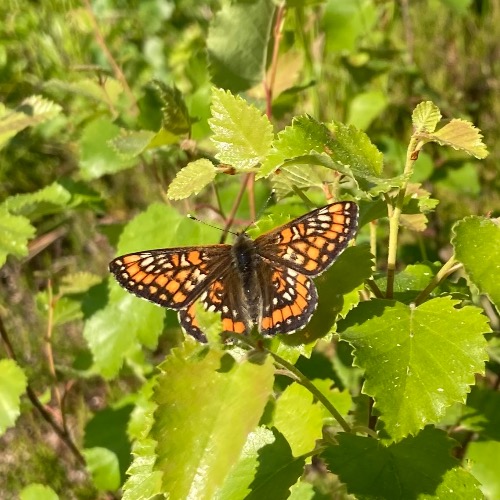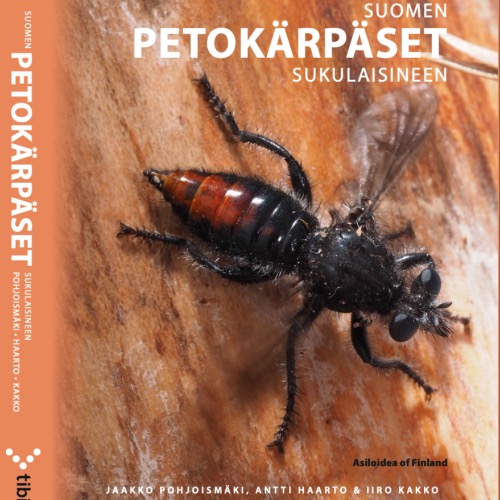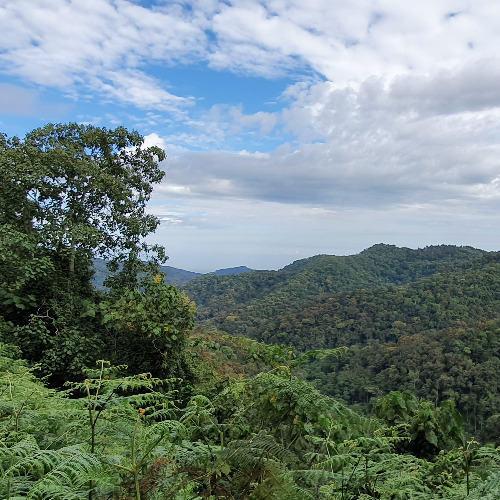
Entomology Joensuu
Entomology is a branch of zoology focusing on insects. Here we present insect research currently taking place in Joensuu, Department of Environmental and Biological Sciences.
Insects, food webs and ecosystem restoration
Insects are all around us and they have important roles in different ecosystems. They have functional roles e.g., as pollinators, herbivores, prey, predators, parasites, and parasitoids. Insects are therefore an important group to consider when ecosystem restoration occurs. The focus in ecosystem restoration has traditionally been vegetation recovery but it is not the only aspect to restore.
We have studied butterflies in a restoration age gradient in a tropical rainforest in Uganda. By collecting lepidopteran data from both adults (fruit-feeding butterflies) as well as caterpillars and their host plants and parasitoids, we aim to illuminate the recovery patterns of fruit-feeding butterflies and plant-caterpillar-parasitoid food webs. For the latter, we utilize DNA-based methods to unravel these previously cryptic interactions featuring several highly diverse insect taxa.
Researchers: Anu Valtonen, Coen Westerduin, & Eveliina Korkiatupa
(Dark) diversity of Diptera
Jaakko Pohjoismäki’s research group is focusing on biodiversity of Diptera, using integrative DNA-based methods, where DNA barcoding data is combined with morphological identifications. A huge portion of Earth’s biodiversity is still unknown, especially within less-studied, tiny-sized, and extremely diverse taxa, such as Diptera and Hymenoptera. These “Dark taxa” are out of reach of traditional morphological methods, as they usually lack easily exploitable morphological cues. One such taxa is phorid flies (Diptera: Phoridae), which is considered to be one of the most diverse insect groups globally. Our aim is to use of DNA barcodes (COI, and a few nuclear markers) alongside morphology to shed light into this taxon and create a reliable reference library for Finnish species and provide new tools for species discovery.
We are also performing metabarcoding using Nanopore’s PromethION sequencing platform, where our aim is to test this platform’s eligibility in species inventory tasks using long-read DNA barcodes. For this project, we have collected samples across Finland using Malaise trap approach and have extracted the DNA non-destructively. As of now, the sequencing step is still on-going.
Researchers: Jaakko Pohjoismäki & Jiri Vihavainen
Biodiversity genomics
Jaakko Pohjoismäki’s research group also contributes to national and international genomics initiatives by providing samples for the production of reference genome assemblies from Finnish insects.
Projects
Cooperation
Keywords
Professors
Senior Researchers
Post-doctoral Researchers
Doctoral Researchers
-
Jiri Vihavainen
Doctoral ResearcherDepartment of Environmental and Biological Sciences, Faculty of Science, Forestry and Technology -

Eveliina Korkiatupa
Visiting ResearcherDepartment of Environmental and Biological Sciences, Faculty of Science, Forestry and Technology
Project Researcher
University teacher
Publications
51 items-
Chronosequence Resampling Elucidates Tree Community and Forest Structure Recovery Patterns in Restored Tropical Rainforest
Korkiatupa, Eveliina; Malinga, Geoffrey M.; Holm, Sille; van Goor, Wouter; Kigenyi, Richard; Valtonen, Anu, 2025, Ecology and evolution, 15, 8, e72033. A1 Journal article (refereed), original research -
Global progress in domesticating edible crickets: a review
Sengendo, Francis; Egonyu, James Peter; Valtonen, Anu; Nyeko, Philip; Alaroker, Martha Franny; Malinga, Geoffrey Maxwell; Van Miert, Sabine, 2025, International journal of tropical insect science, 45, 3, 951-961. A2 Review article, Literature review, Systematic review -
Individual-level size distribution patterns in fruit-feeding butterfly communities along a forest restoration gradient in the Afrotropics
Nakadai, Ryosuke; Akite, Perpetra; Holm, Sille; Kigenyi, Richard; Korkiatupa, Eveliina; Leinonen, Lotta; Malinga, Geoffrey M; Nyafwono, Margaret; van Goor, Wouter; Valtonen, Anu, 2025, Global Ecology and Conservation, 62, e03679. A1 Journal article (refereed), original research -
Machimus rusticus (Meigen, 1820) (Diptera, Asilidae) esiintymä lähellä Suomea [The occurrence of Machimus rusticus (Meigen, 1820) (Diptera, Asilidae) near Finland]
Haarto, Antti; Kakko, Iiro; Pohjoismäki, Jaakko, 2025, W-album, 34, 3–7. D1 Article in a trade journal -
Megabarcoding dark taxa – Assessing the utility of mass DNA barcoding for phorid fly species discovery
Vihavainen, Jiri; Kiljunen, Niina; Pohjola, Pekka; McKeown, Jaclyn; Oinonen, Eveliina; Mutanen, Marko; Pohjoismäki, Jaakko, 2025, PLoS ONE, 20, 12, e0334948. A1 Journal article (refereed), original research -
Strides in farming edible African bush cricket, Ruspolia differens (Serville) (Orthoptera: Tettigoniidae) in East Africa: a systematic review of rearing protocols
Malinga, Geoffrey Maxwell; Angwech, Harriet; Alemu, Mohammed Hussen; Valtonen, Anu; Nyeko, Philip; Egonyu, James Peter, 2025, International journal of tropical insect science, [Epub ahead of print 08 July 2025], 1-18. A1 Journal article (refereed), original research -
The genome sequence of the Black Hairstreak, Satyrium pruni (Linnaeus, 1758) (Lepidoptera: Lycaenidae)
Pohjoismäki, Jaakko; Mutanen, Marko; Wright, Charlotte J.; Meier, Joana I.; Blaxter, Mark L.; Wellcome Sanger Institute Tree of Life Management, Samples and Laboratory team; Wellcome Sanger Institute Scientific Operations: Sequencing Operations; Wellcome Sanger Institute Tree of Life Core Informatics team; Tree of Life Core Informatics collective; Project Psyche Community, 2025, Wellcome open research, 10, 377. A1 Journal article (refereed), original research -
The genome sequence of the Poplar Admiral, Limenitis populi (Linnaeus, 1758) (Lepidoptera: Nymphalidae)
Pohjoismaki, Jaakko; Mutanen, Marko; Wright, Charlotte J.; Meier, Joana I.; Blaxter, Mark L.; Wellcome Sanger Institute Tree of Life Management, Samples and Laboratory team; Wellcome Sanger Institute Scientific Operations: Sequencing Operations; Wellcome Sanger Institute Tree of Life Core Informatics team; Tree of Life Core Informatics collective; Project Psyche Community, 2025, Wellcome open research, 10, 438. A1 Journal article (refereed), original research -
Inferring long-distance movements of insects using combined hydrogen isotope and genetic analyses: A case study of the African edible bush-cricket
Valtonen, Anu; Holm, Sille; Korkiatupa, Eveliina; Malinga, Geoffrey M.; Nakadai, Ryosuke; Nyeko, Philip; Roininen, Heikki; Strandberg, Ursula; Wassenaar, Leonard I; Pilecky, Matthias, 2024, Ecological entomology, [Epub ahead of print 01 December 2024], 1-12. A1 Journal article (refereed), original research -
Phylogenomics and biogeography of sawflies and woodwasps (hymenoptera, symphyta)
Wutke, Saskia; Blank, Stephan M; Boevé, Jean-Luc; Faircloth, Brant C; Koch, Frank; Linnen, Catherine R; Malm, Tobias; Niu, Gengyun; Prous, Marko; Schiff, Nathan M.; Schmidt, Stefan; Taeger, Andreas; Vilhelmsen, Lars; Wahlberg, Niklas; Wei, Meicai; Nyman, Tommi, 2024, Molecular phylogenetics and evolution, 199, 108144. A1 Journal article (refereed), original research




